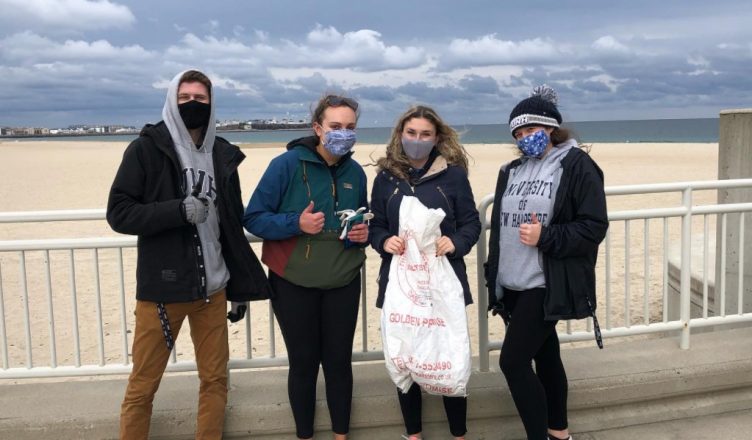By: Nicole Longval, Elizabeth Nerney, Josh Jakobsons, Malian Jennings, and Julia Riendeau
How important it is to clean up trash before getting into the ocean?
Marine debris or marine litter is human-created waste that ends up in our oceans and public waterways either accidentally or purposefully. One such item of marine debris that is of much concern to scientists and animal lovers alike is plastic. Once plastic gets into the environment it never goes away. Rather than breaking down like an organic item would, plastic weakens, through wave action and sunlight, and breaks apart into smaller pieces.
Studies have shown that there are trillions of particles of plastic floating in the ocean (Van Sebille 2015). The effects of plastic in our oceans are of great concern because of its effect on marine life. Animals such as whales, seabirds, or fish can become entangled in this marine debris or even mistake it for food and ingest it. This can cause severe injuries that can be lethal to these animals. If marine life continues to be severely impacted by human waste, we could see drastic changes in marine ecology. The beach begins at your front door, regardless of how far you live from the ocean, so if you see any trash on the beach or in your neighborhood make sure to pick it up and dispose of it properly.
Our experience
COVID-19 has changed the way we go about our daily lives, which includes activities such as beach cleanup. We are a group of students from UNH, and a part of our Ecology class was to participate in a service project to better our community. Prior to, and during our beach cleanup, there were safety precautions such as social distancing and mask-wearing that we had to make use of. Even with these precautions, we were still able to have a fun and successful cleanup! Over the course of an hour and a half, we removed 744 individual pieces of litter totaling 2 pounds from Hampton Beach. It was a great way to spend a Sunday afternoon, especially knowing the positive impact that we were making.
How effective a small group can be in just 1.5 hours?
Being a small group of five individuals we thought it might present a challenge to us and the impact we might have. We quickly learned that there is no small impact when it comes to helping our environment. As we picked up items one by one, a cigarette butt here a disposable mask there, it seemed we might only return with a handful of trash. However, as time passed, we saw the number of items collected getting larger and larger. By the end of the hour and a half, we had collected over 700 individual pieces totaling 2 pounds. Beach cleanups are truly a rewarding experience. Knowing the trash we picked up won’t end up in our marine environment and won’t cause harm to wildlife is empowering. Seeing how much change a small group can do in such little time should encourage others to do the same.
To sign-up for your own beach cleanup click here!
References:
Van Sebille, E., Wilcox, C., Lebreton, L., Maximenko, N., Hardesty, B.D., Van Franeker, J.A.,
Eriksen, M., Siegel, D., Galgani, F. and Law, K.L., 2015. A global inventory of small floating plastic debris. Environmental Research Letters, 10(12), p.124006.






